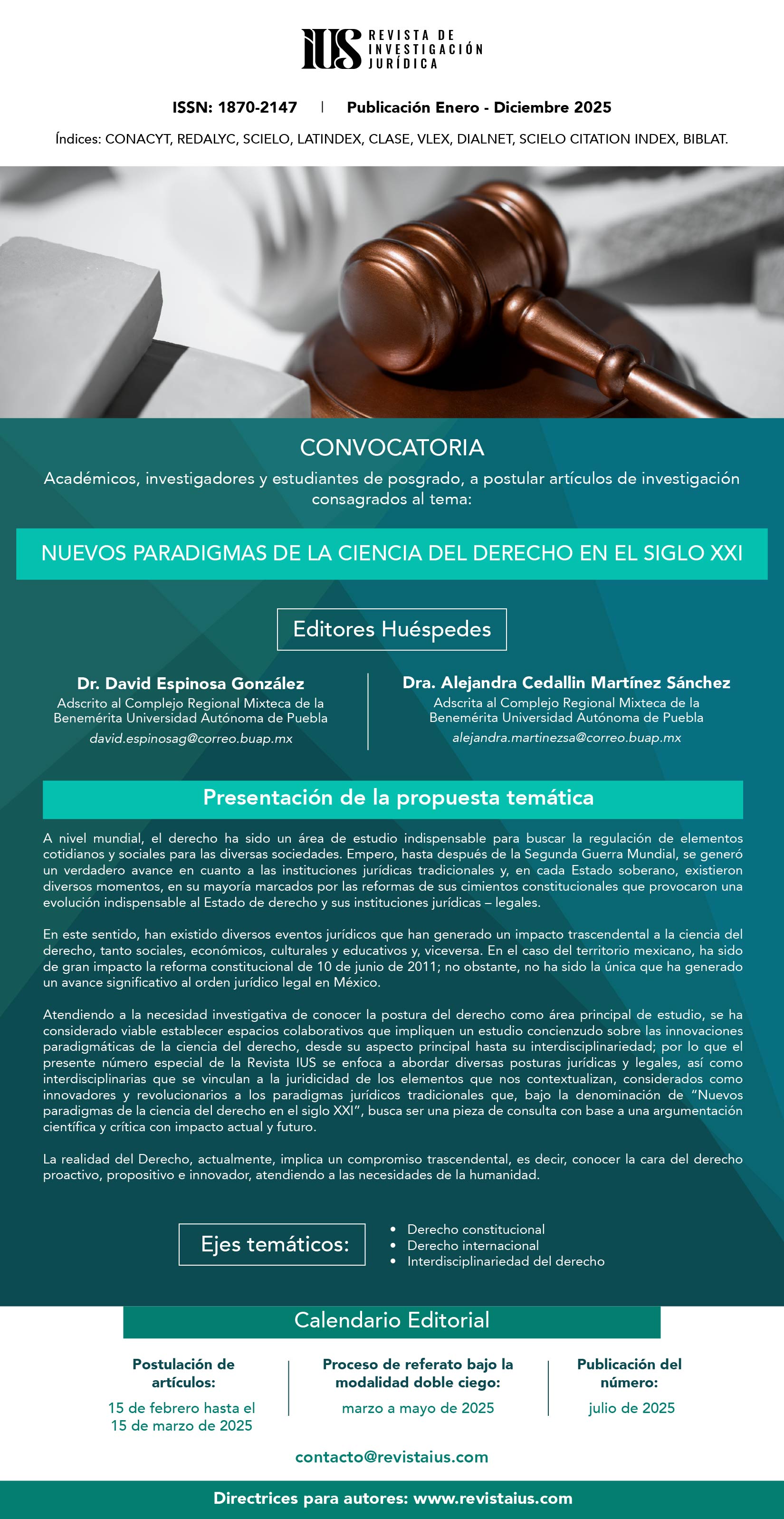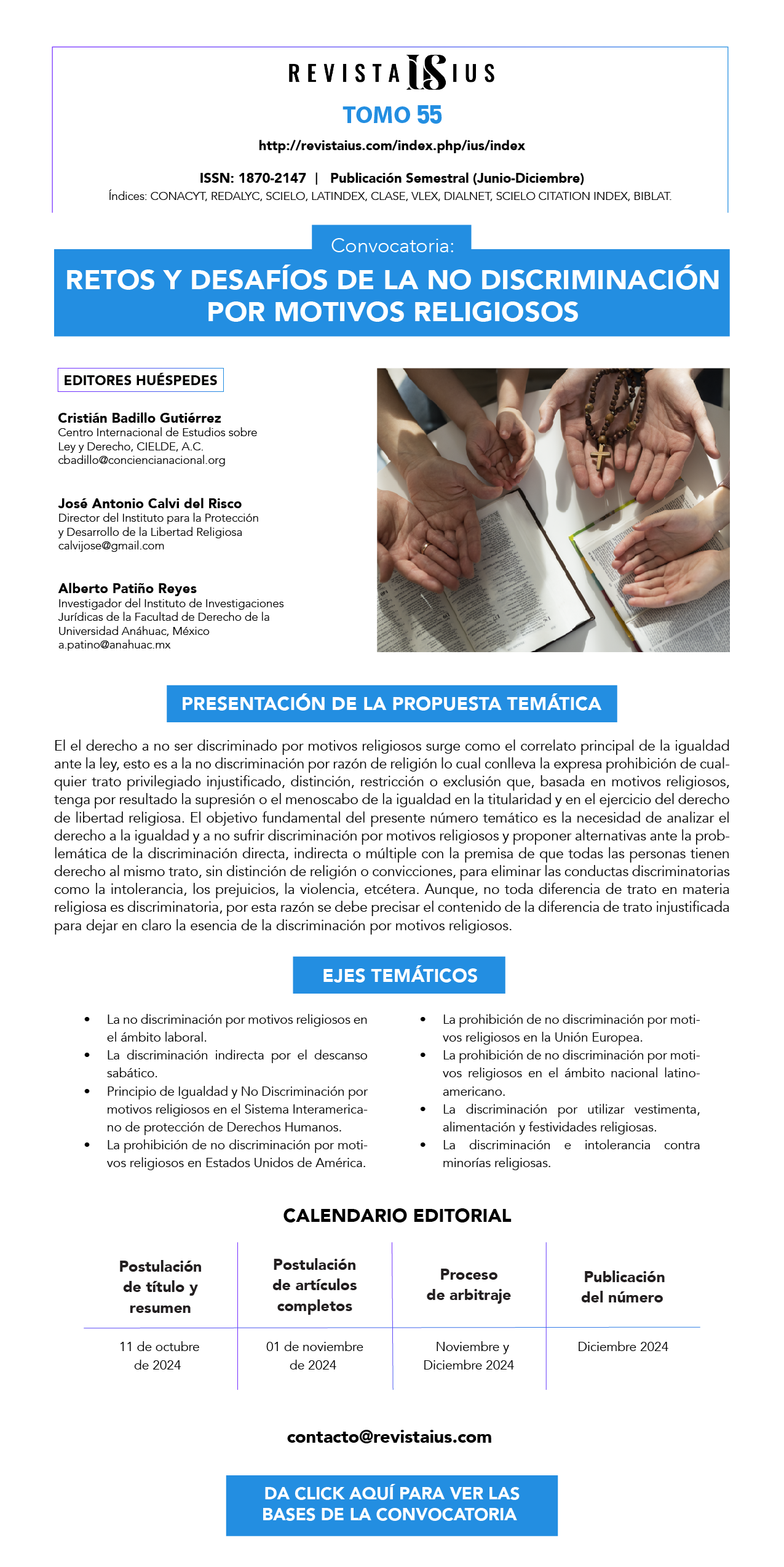¿Reformar sin gobernar? Desafíos institucionales de las policías en América Latina
DOI:
https://doi.org/10.35487/rius.v13i44.2019.444Palabras clave:
Policía, América Latina, criminalidad, Seguridad CiudadanaResumen
El incremento de la inseguridad y el crimen en América Latina han otorgado un rol central a la policía. Los logros son limitados y la percepción es crítica a la efectividad. Corrupción, abuso del uso de la fuerza, lentitud, e incluso apatía, son algunas de las características que se atribuyen a las policías en prácticamente todos los países de la región. El presente artículo revisa los procesos de reforma policial. Para ello, establece como eje articulador la capacidad de gobierno civil de las instituciones policiales: el interés y la posibilidad real por parte de funcionarios y actores gubernamentales de limitar la autonomía política de las policías, aumentar la transparencia, la rendición de cuentas y fortalecer la capacidad y efectividad institucional. Los resultados evidencian transformaciones claras que han fortalecido la autonomía burocrática, más que el efectivo control civil. Así, se reforma bastante y se gobierna poco.
Descargas
Citas
Referencias
Aitchison Andy, Jarret Blaustein, “Policing for democracy or democratically responsive policing? Examining the limits of externally driven police reform”, European Journal of Criminology 10, N. 4, 2013, pp. 496-511.
Antillano, Andrés, “Crimen y castigo en la revolución bolivariana”, Cuestiones de Sociología, 10, 2014, http://www.cuestionessociologia.fahce.unlp.edu.ar/article/view/CSn10a19/6096)
Antillano, Andrés, “¿Qué conocemos de la violencia policial en Venezuela? Las investigaciones e hipótesis sobre el uso de la fuerza física por la policía”, Espacio Abierto, 19, N. 2, 2010, pp. 331-345, p. 335.
Arias Desmond Enrique, Daniel Goldstein, editores, Violent Democracies in Latin America, Durham, Duke University Press, 2010.
Arias Patricia, Héctor Rosada-Granados, Marcelo Fabián Saín, Reformas policiales en América Latina. Principios y lineamientos progresistas. FES, Bogotá, 2012.
Azaola, Elena, Imagen y autoimagen de la policía de la ciudad de México. México, Edición Coyoacan, 2006.
Blattman Christopher, Donald Green, Daniel Ortega, Santiago Tobon, “Pre-Analysis Plan for “The Impact of Hotspot Policing and Municipal Services on Crime: Experimental Evidence from Bogotá” (Consultado el 20 de Octubre de 2017) (Disponible en: https://www.aas.jjay.cuny.edu/single-post/ENG-Blattman-etal-2016)
Bobea, Llilian, “The emergence of the democratic citizen security policy in the Dominican Republic”, Policing and Society, 22, N.1, 2012, pp. 57_75.
Bonner, Michelle, “Rethinking debates on media and police reform in Argentina”, Policing and Society, 26, N.8, 2015, pp. 925-943.
Bulla Patricia, Sergio Guarin, Formación policial y seguridad ciudadana ¿Cómo mejorar el servicio de policía? Análisis, Fundación Ebert, Bogotá, 2015, p. 4.
Brinks, Daniel, The judicial response to police killings in Latin America: Inequality and the rule of law. New York: Cambridge University Press, 2016.
Bruneau, Thomas, Lucía, Dammert, Elizabeth Skinner, Maras: Gang Violence and Security in Central America. Austin, TX, University of Texas Press, 2011.
CAF, Programa sobre uso de la fuerza y empleo de armas de fuego. Resumen de evaluación de impacto, Caracas, CAF, 2014. (Consultado el 20 de Octubre de 2017) (Disponible en: http://scioteca.caf.com/handle/123456789/455)
CAF. Proyecto ‘Puntos Calientes’ Colombia. Caracas: CAF, 2015. Accessed June 3, 2016. http://scioteca.caf.com/handle/123456789/804
Cano,Ignacio, Os donos do morro; uma avilacao exploratória do impacto das Unidades de Polícia Pacificadora (UPPs) no Rio de Janeiro. Rio de Janeiro, Relatorio do LAV-CAF, 2012, (Consultado el 21 de Octubre de 2017) (Disponible en: http://www.lav.uerj.br/docs/rel/2012/RelatUPP.pdf)
Carroll, Rory. “Deadly force: Venezuela’s police have become a law unto themselves”. The Guardian, September 6, 2009. (Consultado el 28 de Octubre de 2017) (Disponible en: https://www.theguardian.com/world/2009/sep/06/venezuela-police-law-themselves)
Corbacho Ana, Philipp Julia, Mauricio Ruiz-Vega, “Crime and Erosion of trust: Evidence for Latin America”, World Development 70, 2015, pp. 400-415.
CRISP & Datafolha, Pesquisa Nacional de Victimizaçao. Sumário Executivo SENASP. CRISP & Datafolha, may 2013. (Consultado el 27 de Octubre de 2017) (Disponible en: http://www.interconect.com.br/clientes/pontes/blog/pnv.pdf
Cruz, José Miguel, “Police Misconduct and Political Legitimacy in Central America”, Journal of Latin American Studies, 47, N.2, 2015, pp. 251-283.
Dammert, Lucía, The Peruvian Perfect Storm: State Fragility, Corruption and Organized Crime, En: Kassab, H. & J. Rosen, editores, Fragile States in the Americas, Washington DC, Lexington Books, 2016, pp. 78-101.
Dammert, Lucía, Fear and Crime in Latin America: Redefining State-Society Relations. New York: Routledge, 2012
Dammert Lucia, Felipe Salazar, ¿Duros con el delito? Populismo e inseguridad en América Latina. Santiago de Chile: FLACSO, 2009.
Dammert, Lucía, John Bailey, Seguridad y reforma policial en las Américas, Siglo XXI, México, 2005.
Diamint, Rut, “A new militarism in Latin America”, Journal of Democracy, 26, N.4, 2015, pp. 155-168.
Dudley, Steven, How drug trafficking operates, corrupts in Central America. Insight Crime, July 2016. (Consultado el 17 de Septiembre de 2017) (Disponible en: http://www.insightcrime.org/news-analysis/how-drug-trafficking-operates-corrupts-in-central-america).
Frühling, Hugo, “Recent police reform in Latin America”, Niels Uldriks, editor, Policing Insecurity. Police reform, security and human rights in Latin America, Landham, Lexington, 2009, pp. 21-47,
Glanc, Laura, “Caught between soldiers and police officers: police violence in contemporary Argentina”, Policing and Society, 24, N. 4, 2014, pp: 479-496.
Hathazy, Paul, “Fighting for a democratic police: Politics, Experts and Bureaucrats in the transformation of the police in post-authoritarian Chile and Argentina”, Comparative Sociology, 12, 2013, pp. 1-43.
Hinton, Mercedes. The State on the Streets. Police and Politics in Argentina and Brazil. Denver: Lynne Rienner, 2006,
HRW, World Report 2016. Human Rights Watch, 2016. (Consultado el 20 Noviembre del 2017) (Disponible en: https://www.hrw.org/sites/default/files/world_report_download/wr2016_web.pdf)
HRW, World Report 2014, Human Rights Watch, Nueva York, 2015, p. 65.
Igarapé (2017) Homicide Monitor. https://homicide.igarape.org.br/
Jaitman, Laura, Sebastian Galiani, “La teoría detrás de la reforma de la policía en Montevideo” (Consultado el 20 de Octubre de 2017) (Disponible en: http://blogs.iadb.org/sinmiedos/2015/12/17/economia-del-crimen-aplicada-el-caso-de-montevideo/ )
Jaitman, Laura, The costs of crime and violence: New evidence and insights in Latin America and the Caribbean, IADB, 2016. (Consultado el 18 de Octubre del 2017), (Disponible en: https://publications.iadb.org/handle/11319/8133#sthash.VUbnzmII.dpuf)
Jaitman Laura, Nicolás Ajzenman, Crime concentration and hot spot dynamics in Latin America, BID, Working Paper Series # 699, 2016.
Lagos, Marta, Lucía, Dammert, La Seguridad Ciudadana: El Problema Principal De América, Santiago de Chile: Latinobarometro [fecha de consulta 10 Octubre 2017]. Disponible en http://www.latinobarometro.org/documentos/LATBD_La_seguridad_ciudadana.pdf.
Magaloni Beatriz, Edgar Franco, Vanessa Melo, Killing in the Slums: An Impact Evaluation of Police Reform in Rio de Janeiro, Stanford Working paper 556, 2015, (Consultado el 20 de Octubre de 2017) (Disponible en: http://globalpoverty.stanford.edu/sites/default/files/publications/556wp.pdf)
Mckenna Joseph, Joycelyn, Pollock, “Law Enforcement Officers in Schools: An Analysis of Ethical Issues”, Criminal Justice Ethics, 33, N. 3, 2014, pp. 163-184.
Mejía Daniel, Daniel Ortega, José Francisco García, “Police Reform, Training and Crime: Experimental evidence from Colombia’s Plan Cuadrantes”. Documentos de trabajo. 1. CAF, Caracas, 2013.
Moncada, Eduardo, “Toward Democratic Policing in Colombia? Institutional Accountability through Lateral Reform”, Comparative Politics, 41, N. 4, 2009, pp. 431-449.
Mota-Prado, Mariana, Michael Trebilcock, Patrick Hartford, "Police Reform in Violent Democracies in Latin America", Hague Journal on the Rule of Law, 4, N. 2, 2012, pp. 252-85
Osse Anneke, Ignacio Cano, “Police deadly use of firearms: an international comparison”, The International Journal of Human Rights, 21 , N. 5, 2017, pp. 629-649.
Pásara, Luis, “International support for justice reform: Is it worthwhile?”, Mexican Law Review, 6, n. 1, 2013, pp. 75-118.
Reiner, Robert, The politics of the police. Hemel Hemstead, Harvester Wheatsheaf, 1992
Riccio, Vicente, Marco Aurelio Ruediger, Steven Dutt Ross, Wesley Skogan, “Community policing in the Favelas of Rio de Janeiro”, Police Practice and Research: An International Journal, 14, N. 4, 2013, pp.308–318.
Ruiz Torres, Miguel, Elena, Azaola Garrido, “Cuadrar el delito: Corrupción institucional y participación de policías en el secuestro en México”, Perfiles latinoamericanos, 22, N. 4, 2014, pp. 91-112
Saín, Marcelo Fabian, El Leviatán azul. Policía y Política en la Argentina, Buenos Aires, Siglo XXI, 2008.
Saín, Marcelo Fabian, La reforma policial en América Latina: Una mirada crítica desde el progresismo, Prometeo Libros, Buenos Aires, 2010, p. 80.
Saín, Marcelo Fabian, “Es la política, estúpido. El Gobierno Federal frente a la reforma policial en Argentina”, Comunes, 1, 2012, pp. 35-64.
Seri, Guillermina, Seguridad: Crime, Police Power, and Democracy in Argentina, New York, Continuum International Publishing Group, 2012.
Serrano-Berthet Rodrigo, ¿Cómo evitar el delito? BID, Montevideo, 2017.
Serrano-Berthet, Rodrigo, O retorno do Estado às favelas do Rio de Janeiro: Uma análise da transformacao do dia a dia das comunidaes após o processo de pacificacao das Upps, Banco Mundial, 2013, (Consultado el 21 de Octubre de 2017).
Sharp, Douglas, “Who needs theories in policing? An introduction to a special issue on policing”, The Howard Journal, 44, N. 5, 2005, p. 453
Sozzo, Máximo, “Policing after Dictatorship in South America”, En: Ben Bradford, Beatrice Jauregui, Ian Loader, Jonny Steinberg, editores, The SAGE Handook of Gobal Policing, London: SAGE Publications, 2016, pp. 337-355.
Srur, Jorge, editor, ¿Qué observan los que observan el delito? Pasado, presente y futuro de los observatorios del crimen y la violencia en América Latina y el Caribe, BID, 2014. (Consultado el 20 de Octubre del 2017) (Disponible en: https://publications.iadb.org/ )
Tello, Nelia, “Police reforms: the voice of police and residents in Mexico City”, Policing and Society, 22, N. 1, 2012, pp-14-27.
Transparencia Internacional, Corruption Perceptions Index 2015. Transparency International, 2015. (Consultado el 10 de Septiembre de 2017) (Disponible en: http://www.transparency.org/cpi2015).
Ungar, Mark, “The Privatization of Citizen Security in Latin America: From Elite Guards to Neighborhood Vigilantes”, Social Justice, 34, 2007, pp. 20-37.
Ungar, Mark, "The Rot Within: Security and Corruption in Latin America", Social Research: An International Quarterly, 80, n. 4, 2013, pp. 1187-1212.
Wilson David, Roger Parks, Stephen Mastrofski, “The impact of police reform on communities of Trinidad and Tobago”, Journal of Experimental Criminology, 7, 2011, pp. 375-405.
Publicado
Número
Sección
Licencia
Revista IUS por el Centro Internacional de Estudios sobre Ley y Derecho. se distribuye bajo una Licencia Creative Commons Atribución-NoComercial-CompartirIgual 4.0 Internacional.
Autorizamos a sus colaboradores a que suban una copia de sus trabajos publicados en sus webs personales o en cualquier repositorio de acceso abierto, siempre y cuando se mencione específicamente a la Revista IUS como fuente original de procedencia, citando el año y número del ejemplar respectivo y añadiendo el enlace a la página web donde este órgano editorial puede ser consultado in toto, de manera abierta y gratuita en: http://www.revistaius.com
Las y los lectores tienen libertad para:
Compartir, copiar y redistribuir el material en cualquier medio o formato.
El licenciante no puede revocar estas libertades en tanto usted siga los términos de la licencia.
De acuerdo con los siguientes términos:
Atribución: El lector debe reconocer el crédito de una obra de manera adecuada, proporcionar un enlace a la licencia, e indicar si se han realizado cambios. Puede hacerlo en cualquier forma razonable, pero no de forma tal que sugiera que tiene el apoyo del licenciante o lo recibe por el uso que hace.
No comercial: El lector no puede hacer uso del material con fines comerciales.
Si remezcla, transforma o crea a partir del material, deberá difundir sus contribuciones bajo la misma licencia que el original.
Cargos por gestión de artículos
Revista IUS no cobra tarifas por recibir, procesar o publicar los artículos (Article Processing Charge [APC]) enviados por los autores.





